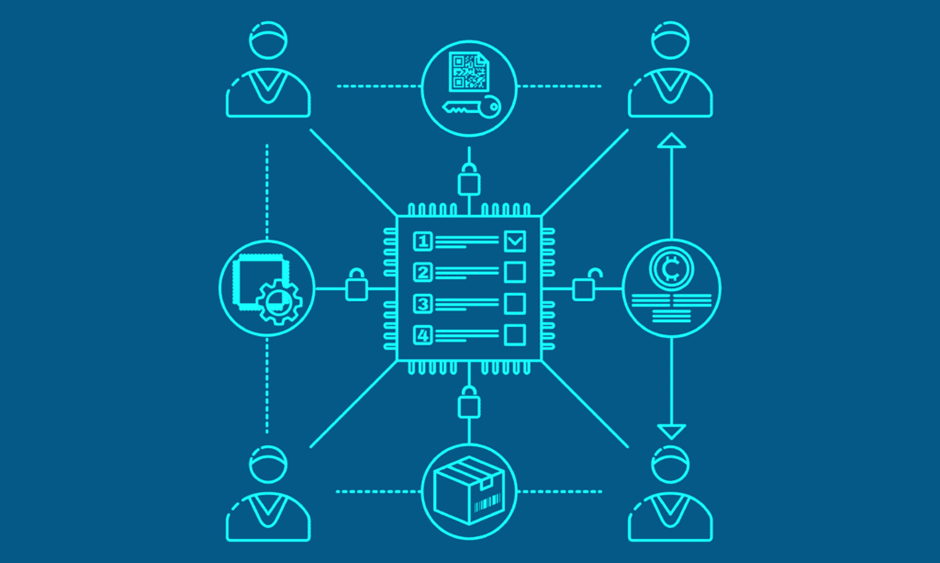Smart contracts have gained popularity in recent years with the introduction of blockchain technology. It has become the center of attraction due to its high-tech and secured approaches to making legal deals. Smart contracts are initiated with blockchain programming with self-executing features. They operate on blockchain platforms, enabling automatic transactions when predetermined conditions are met without intermediaries.
This drastic change enables businesses to move towards decentralized and automated solutions across various industries. Many industries, including real estate, healthcare, banking, and supply chain management, are all looking into how they can use blockchain technology and smart contracts to make processes more efficient, safer, and depend less on centralized authorities.
In this blog, we’ll discuss ” smart contracts ” in more detail and find out whether they are the future of legal agreements. We will also explore the advantages and challenges and how digital transformation companies are approaching the potential of smart contracts.
Advantages of Smart Contracts

As businesses go digital and look for faster and safer ways to carry out agreements, smart contracts will become more important in shaping the future of legal agreements. Let’s see some of Smart Contract’s advantages below:
1.1 Efficiency Gains through Automation
One of the best things about smart contracts developed by smart contract developers is that they make things more efficient by automating tasks and reducing manual processing time. In traditional legal agreements, the terms are often enforced through paperwork, human checks, and intermediaries. But smart contracts developed by smart contract developers automatically carry out set actions when certain conditions are met.
Moreover, smart contracts operate 24/7 and can execute transactions in real-time, leading to faster settlement times and quicker resolution of disputes. By removing bureaucratic bottlenecks and automating routine tasks, smart contracts enable businesses to operate more efficiently and focus on value-added activities.
1.2 Transparency, Security, and Cost Savings
One of the best things about smart contracts is that they are transparent, safe, and cost-effective. Smart contracts run on blockchain platforms, which track all the activities and can not be changed, keeping the transaction transparent. This transparency ensures that everyone has the same information, which lowers the chance of scams and conflicts.
Smart contracts are also protected by secret methods, which makes it impossible for outsiders to change without permission—increasing the safety of deals and lowering the chances of theft. Smart contracts are cost-effective because they cut out the need for middlemen like lawyers and notaries. This is because they don’t charge transaction or management fees.
1.3 Global Accessibility Enabled by Decentralization
Blockchain technology is autonomous, which means that smart contracts can be used anywhere in the world, even if they are not legal in some places. Smart contracts work on independent networks that no one organization or government controls. This differs from traditional legal deals, which may have different rules and regulations in each country.
This global accessibility makes it easier to do business across borders and eliminates expensive intermediaries to make international deals. Furthermore, the autonomous nature of blockchain technology increases trust and lowers dependency on centralized authorities.
Challenges and Considerations

We have seen smart contracts’ advantages in the above section, so let’s explore the challenges that today’s businesses need to address.
2.1 Legal Recognition and Acceptance
Smart contracts have a lot of advantages, but one fundamental challenge it face is legal recognition and acceptance from the governments. Legal systems worldwide are still trying to determine what smart contracts are and how to include them in their current laws and rules. In the lack of standard legal systems, questions arise regarding issues such as contract formation, enforceability, and dispute resolution in the absence of traditional legal mechanisms.
2.2 Security Vulnerabilities and Robust Measures
Another thing to consider with smart contracts is that the code underneath them might have security holes. Smart contracts run themselves based on predefined conditions. If there are any bugs or mistakes in the code, it could cause unexpected results or security breaches. Hackers could use bugs in the code of smart contracts to change deals, steal money, or interrupt operations.
Moreover, utilizing a secure blockchain wallet adds a layer of protection for managing and storing digital assets involved in smart contract transactions. By safeguarding private keys and employing encryption protocols, blockchain wallets enhance the overall security posture of smart contract operations, fortifying against unauthorized access and potential theft.
2.3 Complexity and Accessibility for Non-Technical Users
Smart contracts can be complex to understand and use, especially for people who aren’t tech-savvy and need more knowledge. Blockchain technology, security principles, and the blockchain programming used to write smart contracts can be challenging for people and companies unfamiliar with understanding and use.
To solve this problem, we need smart contracts that are easy to create, install, and work with, along with easy tools and platforms for anyone to use. More people can use the benefits of smart contracts without in-depth technology knowledge by making them easier to reach and making the platforms simple.
Use Cases and Examples

As businesses and digital transformation companies continue to explore the potential of blockchain technology, smart contracts are poised to play an increasingly important role in shaping the future of legal agreements.
3.1 Real-World Examples of Smart Contract Applications
Smart contracts curated by smart contract developers have been used successfully in many fields, showing that they can speed up processes and make them more safe and secure. Here are some cases of smart contracts being used in the real world:
- Supply Chain Management: Blockchain programming is used to develop smart contracts that Walmart and IBM use to keep track of products moving through the supply chain. This ensures that everyone is transparent and accountable, lowering the risk of scams and fake goods.
- Finance: Decentralized finance (DeFi) systems use smart contracts to make peer-to-peer loans, automatic trade, and decentralized markets possible. This lets users do business directly without going through standard financial intermediaries.
- Legal Industry: Legaltech companies like OpenLaw and Clause use smart contracts to handle legal agreements like job contracts, non-disclosure agreements (NDAs), and intellectual property licensing agreements. This makes it easier to make contracts and execute the process.
3.2 Advantages of Smart Contracts over Traditional Agreements
There are many ways that smart contracts are better than standard legal deals. They are more efficient, transparent, and safe. Here are some specific situations where smart contracts have shown to be very helpful:
- Faster Settlements: Smart contracts can simplify the payment process, meaning that assets can be transferred almost instantly without banks. This cuts payment times from days to seconds, increasing liquidity and lowering the default risk.
- Transparent and Immutable Records: As smart contracts work on blockchain platforms, the records of deals can’t be changed. This ensures that all parties have access to the same information and can verify the integrity of the contract without relying on trust in intermediaries.
- Cost Savings: By automating contract execution and eliminating the need for intermediaries, smart contracts can significantly reduce transaction costs associated with legal agreements, such as legal fees, administrative overhead, and third-party fees.
- Enhanced Security: Smart contracts are secured by cryptographic algorithms, making them tamper-proof and resistant to unauthorized alterations. This enhances the security of transactions and reduces the risk of fraud, theft, or manipulation.
Potential Impact and Future Outlook

4.1 Ongoing Technological Advancements
As technology improves, a few new developments are getting the limelight that could make smart contracts even more helpful. For example, improvements in the scalability and connectivity of blockchain wallets may let smart contracts handle deals quicker, making them better for use in enterprise-level settings.
Also, improvements in technologies that protect privacy, like zero-knowledge proofs, could ease worries about data privacy and security in smart contracts, making them more useful in sensitive fields like healthcare and finance.
4.2 Increasing Prevalence in Legal Agreements
Smart contracts created by smart contract developers have the potential to become more prevalent in legal agreements across a wide range of industries. As businesses and individuals become more familiar with blockchain technology and its benefits, there is likely a growing demand for blockchain app developers to automate and streamline contract processes.
Additionally, regulatory developments that provide legal recognition and clarity for smart contracts could further drive their adoption in legal agreements. For example, jurisdictions that enact legislation recognizing smart contracts as legally binding instruments may see increased adoption of smart contract technology in various sectors.
4.3 Transformation of Legal Processes and Industry Innovation
Smart contracts facilitated by digital transformation companies could change how legal processes work and create new ideas in many fields if they become widely used. Smart contracts can make business operations more efficient, lower costs, and lower legal risks by automating contract performance, reducing routine work, and improving security and openness.
Blockchain development company could change how contracts are written, negotiated, and enforced in the legal field. This would free lawyers to do more meaningful work, like legal research and strategy advice. Smart contracts make it easier to do business without trusting anyone, boost efficiency, and open new business models in banking, real estate, and supply chain management.
4.4 The Part eTraverse Plays in Driving Adoption and Change
eTraverse, a leading blockchain development company, offers blockchain programming solutions in various industries. We have a team of blockchain app developers who can help you to leverage smart contracts to automate your business operations.
Through our innovative solutions and collaborative approach, we aim to empower businesses to harness the full potential of smart contracts and blockchain technology. Whether it’s developing custom smart contract solutions, providing consultancy services, developing blockchain wallet apps, or facilitating ecosystem partnerships, we are committed to helping businesses navigate the complexities of smart contract adoption.
Conclusion
In this blog, we’ve explored whether smart contracts are the future of legal agreements. We discussed their potential to revolutionize traditional processes, automate tasks, and enhance transparency and security. Despite challenges like legal recognition and security vulnerabilities, smart contracts offer numerous advantages, including efficiency gains and cost savings.
We highlighted real-world examples of successful applications across industries and considered potential scenarios for increased adoption. Smart contracts can transform legal processes, drive innovation, and streamline operations.
Overall, we have seen that smart contracts represent a transformative force in legal agreements. As businesses embrace digital innovation, smart contracts developed by smart contract developers are poised to play a pivotal role in shaping the future of contract management and execution.
Contact Us Today
